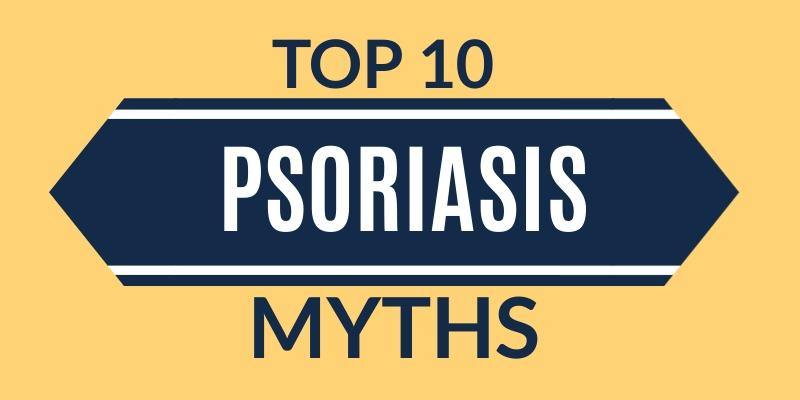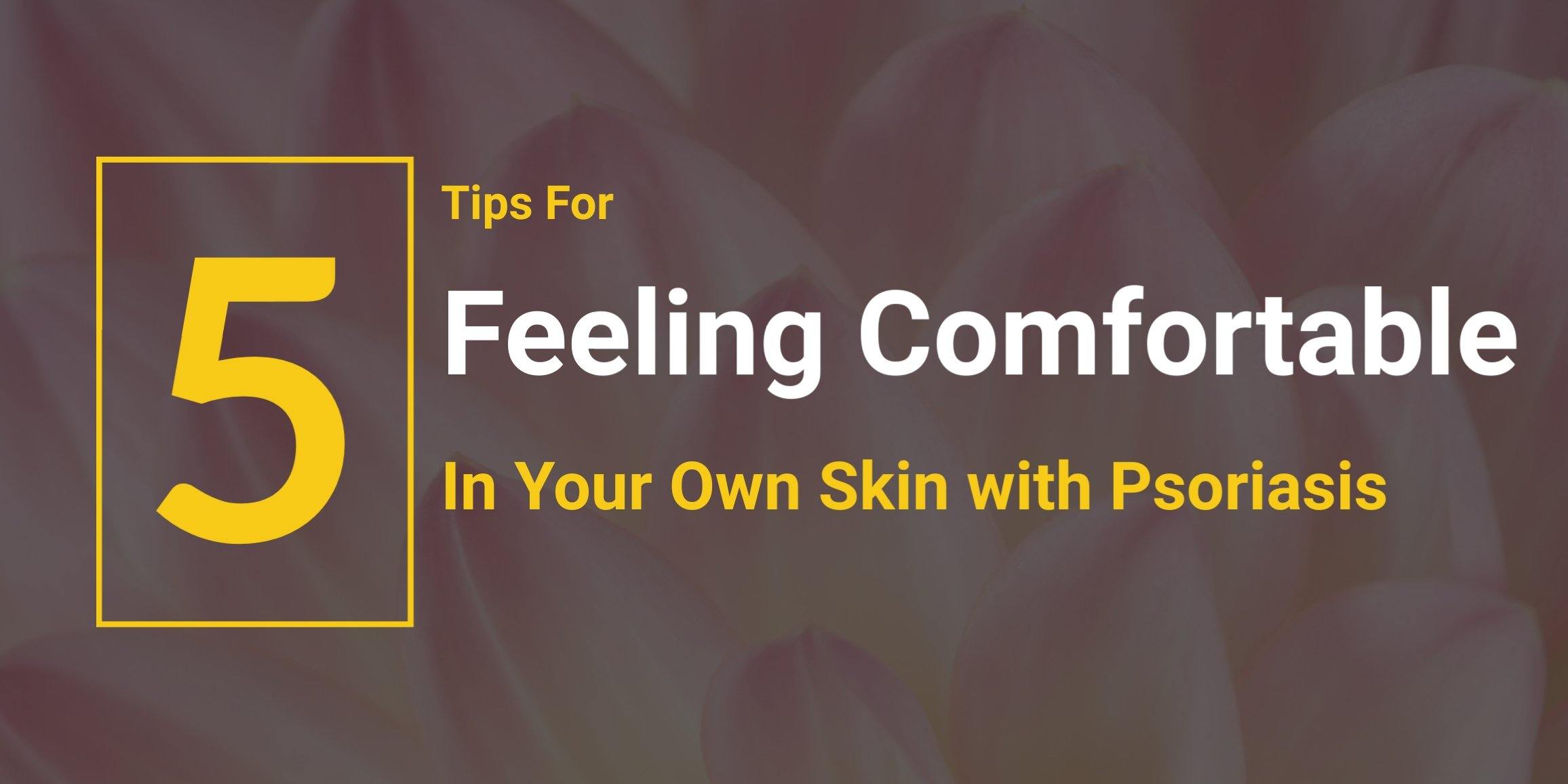
10 Myths and Things People Assume About Psoriasis
Living with psoriasis isn’t easy and the myths and assumptions people make about psoriasis can make it even more frustrating. If someone has ever downplayed your psoriasis, just remember that you aren’t alone. In fact, nearly 3 percent of the world’s population has psoriasis. Here are some of our top myths about psoriasis.
MYTH #1: Psoriasis is the same thing as Eczema
Psoriasis and eczema are often confused with each other because the symptoms share some similarities. However, the way they work is much different. You can learn more about the differences between psoriasis and eczema here. In short, eczema refers to a variety of skin conditions with different root causes whereas psoriasis is caused by an autoimmune disease.
MYTH #2: Psoriasis is Contagious
This is probably one of the most harmful myths about psoriasis. As if living with psoriasis wasn’t hard enough, people are often scared to touch you or come near you thinking they could “catch” psoriasis, especially after seeing your scales. You simply can’t pass on psoriasis to someone else, so there’s nothing to worry about here for your friends and family.
MYTH #3: Psoriasis is simply a skin condition, as if it were a rash
Psoriasis is not just a chronic rash. That’s because it’s caused by an overactive immune system that produces up to ten times as many skin cells than usual. In addition to it being extremely itchy and annoying, it also can be quite painful. Furthermore, those with psoriasis can also have psoriatic arthritis which can cause painful swollen joints.
MYTH #4: Psoriasis is caused by a bad diet, or from eating too much gluten
While there may be a link between diet and psoriasis, it’s not yet explicitly clear. There’s also a misconception that things like gluten cause psoriasis which simply isn’t true. Diet is tricky because certain foods can be triggers in some people but have no impact on others. Therefore, it’s more important to find your own anti-inflammatory diet that works best for you to help keep flare-ups under control.
MYTH #5: You can treat psoriasis through just medication
We wish this were true, but psoriasis should be managed through a holistic 360-degree approach of medication, topical treatment, and lifestyle changes. Prescription steroids can be used to treat flare-ups but can also have long-term negative side effects. It’s important to moisturize and use topical treatments but understand that using them without proper lifestyle changes aren't enough. Consult your doctor to create an effective treatment plan that is customized for you and aim to live a healthy lifestyle.
MYTH #6: You can be cured from having psoriasis
If you have psoriasis, you probably have had a relative or friend who asked you: “well have you tried this or that?” What they don’t understand is that psoriasis is a chronic disease that can’t simply be cured. We wish it were that easy. The good news is that some people can effectively manage their psoriasis so that it doesn’t have a major impact on their lives. Flare-ups can become less frequent too.
MYTH #7: There is just one type of psoriasis
Actually, there are 5 major types of psoriasis including: Plaque, Erythrodermic, Guttate, Inverse, and Pustular. You can learn more about the different types of psoriasis here.
MYTH #8: If you have psoriasis, your offspring will have it too
Genetics only plays a partial role in developing psoriasis. In fact, only 70% of identical twins both have psoriasis. If both parents have psoriasis, the chance of their offspring having it is relatively high, but it’s relatively low if only one parent has it. While genetics is only one variable in developing psoriasis, environmental stress and other triggers also play a role.
MYTH #9: People with psoriasis can’t donate blood
Actually, those with psoriasis can safely donate blood. There’s a misconception because people taking certain prescription oral medications aren’t allowed to donate blood. Make sure to read the policies of your individual blood donation center and review the list of restricted medications. Another exception is if you currently have an infection. The fact of the matter is that a lot of people with psoriasis can be very healthy, despite their chronic condition.
MYTH #10: You can’t live a normal life if you have psoriasis
Even though psoriasis is more challenging to deal with than most people think, it shouldn’t stop you from living a full life. Part of the problem is the fact that psoriasis is surrounded by a lot of stigma which can lead to mental health problems for those with the disease. The way to combat this is to support psoriasis awareness organizations and educate friends and families about the myths and realities of psoriasis.
If you are able to take care of both your physical and mental health and develop a lifestyle and treatment plan that works for you, psoriasis will no longer be able to control your life. You will take control of psoriasis and take back control of your life.
MYTH #1: Psoriasis is the same thing as Eczema
Psoriasis and eczema are often confused with each other because the symptoms share some similarities. However, the way they work is much different. You can learn more about the differences between psoriasis and eczema here. In short, eczema refers to a variety of skin conditions with different root causes whereas psoriasis is caused by an autoimmune disease.
MYTH #2: Psoriasis is Contagious
This is probably one of the most harmful myths about psoriasis. As if living with psoriasis wasn’t hard enough, people are often scared to touch you or come near you thinking they could “catch” psoriasis, especially after seeing your scales. You simply can’t pass on psoriasis to someone else, so there’s nothing to worry about here for your friends and family.
MYTH #3: Psoriasis is simply a skin condition, as if it were a rash
Psoriasis is not just a chronic rash. That’s because it’s caused by an overactive immune system that produces up to ten times as many skin cells than usual. In addition to it being extremely itchy and annoying, it also can be quite painful. Furthermore, those with psoriasis can also have psoriatic arthritis which can cause painful swollen joints.
MYTH #4: Psoriasis is caused by a bad diet, or from eating too much gluten
While there may be a link between diet and psoriasis, it’s not yet explicitly clear. There’s also a misconception that things like gluten cause psoriasis which simply isn’t true. Diet is tricky because certain foods can be triggers in some people but have no impact on others. Therefore, it’s more important to find your own anti-inflammatory diet that works best for you to help keep flare-ups under control.
MYTH #5: You can treat psoriasis through just medication
We wish this were true, but psoriasis should be managed through a holistic 360-degree approach of medication, topical treatment, and lifestyle changes. Prescription steroids can be used to treat flare-ups but can also have long-term negative side effects. It’s important to moisturize and use topical treatments but understand that using them without proper lifestyle changes aren't enough. Consult your doctor to create an effective treatment plan that is customized for you and aim to live a healthy lifestyle.
MYTH #6: You can be cured from having psoriasis
If you have psoriasis, you probably have had a relative or friend who asked you: “well have you tried this or that?” What they don’t understand is that psoriasis is a chronic disease that can’t simply be cured. We wish it were that easy. The good news is that some people can effectively manage their psoriasis so that it doesn’t have a major impact on their lives. Flare-ups can become less frequent too.
MYTH #7: There is just one type of psoriasis
Actually, there are 5 major types of psoriasis including: Plaque, Erythrodermic, Guttate, Inverse, and Pustular. You can learn more about the different types of psoriasis here.
MYTH #8: If you have psoriasis, your offspring will have it too
Genetics only plays a partial role in developing psoriasis. In fact, only 70% of identical twins both have psoriasis. If both parents have psoriasis, the chance of their offspring having it is relatively high, but it’s relatively low if only one parent has it. While genetics is only one variable in developing psoriasis, environmental stress and other triggers also play a role.
MYTH #9: People with psoriasis can’t donate blood
Actually, those with psoriasis can safely donate blood. There’s a misconception because people taking certain prescription oral medications aren’t allowed to donate blood. Make sure to read the policies of your individual blood donation center and review the list of restricted medications. Another exception is if you currently have an infection. The fact of the matter is that a lot of people with psoriasis can be very healthy, despite their chronic condition.
MYTH #10: You can’t live a normal life if you have psoriasis
Even though psoriasis is more challenging to deal with than most people think, it shouldn’t stop you from living a full life. Part of the problem is the fact that psoriasis is surrounded by a lot of stigma which can lead to mental health problems for those with the disease. The way to combat this is to support psoriasis awareness organizations and educate friends and families about the myths and realities of psoriasis.
If you are able to take care of both your physical and mental health and develop a lifestyle and treatment plan that works for you, psoriasis will no longer be able to control your life. You will take control of psoriasis and take back control of your life.



Leave a comment
This site is protected by hCaptcha and the hCaptcha Privacy Policy and Terms of Service apply.